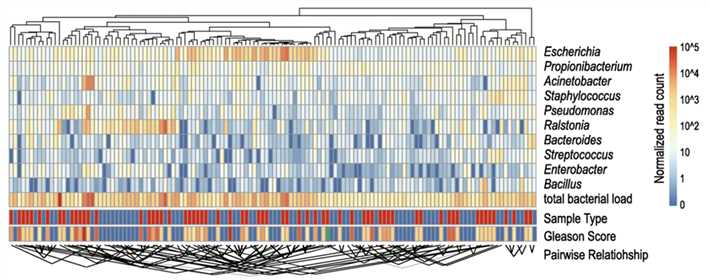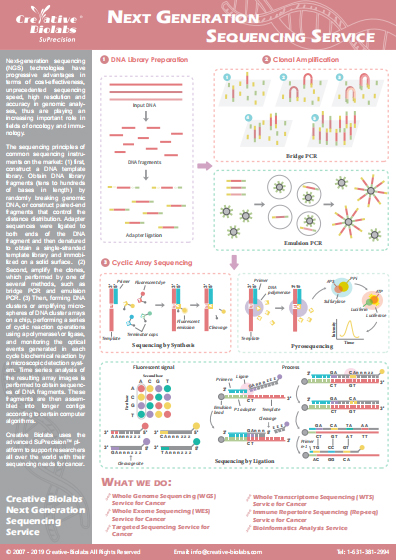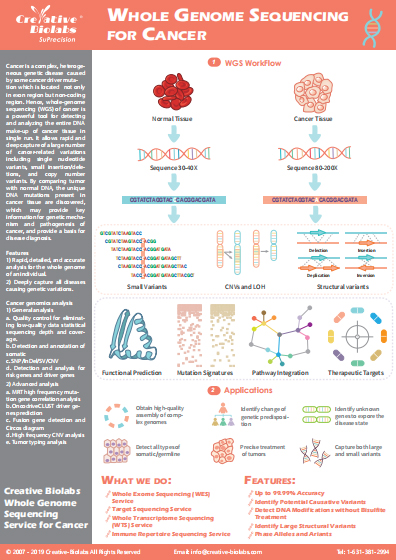
Metagenomic Sequencing Service for Cancer-associated Bacteria
With these data, our customers will acquire deep knowledge, which is extremely useful in investigating its association with tumor clinical characteristics as well as host expression profiles. Creative Biolabs has developed the world-leading SuPrecision™ Platform, and our proficient scientists provide metagenomics sequencing to assist you in cancer-associated bacteria studies.
Cancer-associated Bacteria
- Colorectal cancer-associated bacteria
CRC is one of the most common cancer types, with the third highest incidence rate and the fourth highest mortality rate of all cancer types worldwide. Approximately 1014 colony-forming units of bacteria colonize the human intestinal tract, particularly within the distal intestine, which contains 1,000–1,150 prevalent bacterial species. Accumulated evidence suggests that the gut bacteria are associated with CRC and can modulate colorectal tumorigenesis. Firmicutes and Fusobacteria are more highly abundant in CRC patients compared with healthy individuals, whereas Proteobacteria are less abundant in patients with CRC. It has been demonstrated that the bacterial composition of stool samples prior to and following surgery are markedly different. The bacterial composition is greatly improved following surgery. Researchers have also found that the composition of the bacterial community in every patient is different, and certain novel bacteria have been identified. Metagenomics is a horizon in CRC cancer research, which can provide comprehensive information of bacterial community, such as bacteria diversity index and bacterial composition.
- Prostate cancer (PCa)-associated bacteria
PCa is the most common malignant neoplasm among men in many countries. Since most precancerous and cancerous tissues show signs of inflammation, chronic bacterial prostatitis has been hypothesized to be a possible etiology. However, establishing a causal relationship between bacterial infection and PCa requires a comprehensive analysis of the prostate microbiome. The advent of metagenomics sequencing makes the research of microbiome more feasible.
 Fig.1 Bacterial composition of prostate microbiome revealed by metagenomic sequencing. (Feng, 2019)
Fig.1 Bacterial composition of prostate microbiome revealed by metagenomic sequencing. (Feng, 2019)
- Breast cancer-associated bacteria
Breast cancer is the second most common cancer in women and affects approximately 1 in 9 women over the course of their lifetime. The residency of bacteria in breast tissue has been affirmed in several studies documenting the microbiota from healthy breast tissue, mammary glands, and breast milk. As a whole, the breast is a favorable environment for the growth of bacteria, as it is made up of fatty tissue, with extensive vasculature and lymphatic drainage. Certain bacterial strains found in the breast have been shown to produce lantibiotics, a class of bacteriocins capable of limiting the growth of pathogenic bacteria which could trigger chronic inflammation leading to malignancy. In the meantime, certain bacterial species have been reported to contribute to breast cancer. Specifically, a variety of bacteria have been found in greater abundances in the cancer tissue compared with corresponding normal tissue. These include Methylobacterium, Atopobium, Fusobacterium, Gluconacetobacter, Hydrogenophaga, Lactobacillus, Bacillus, Enterobacteriaceae, Staphylococcus, Haemophilus influenzae, and Streptococcus pyogenes. Understanding the relationship between the local microbiota and breast cancer is extremely important for the diagnosis and treatment of breast cancer.
Metagenomics Sequencing Service for Cancer-associated Bacteria in Creative Biolabs
Scientists from Creative Biolabs are proficient in providing metagenomics sequencing service for cancer-associated bacteria. The service process is as follows: 1) sample processing, 2) library construction and deep sequencing, 3) read mapping, gene expression quantification and profile classification, 4) assignment of reads to bacterial taxa, 5) differential analysis of bacterial species.
Key Advantages
- Various types of cancer sample are available
- Identification of low abundant bacteria
- Identification of novel biomarker for diagnosis
Metagenomics sequencing combined with bioinformatics is a powerful tool for analyzing the large number of bacterial community in a sample. The result will better inform us role of bacteria in host gene expression, oncogenesis and tumor suppression. Furthermore, the identification of cancer-associated bacteria can be used to predict the occurrence of cancer or as a novel marker for diagnosis. Creative Biolabs proudly introduces our professional service of metagenomics sequencing service for cancer-associated bacteria. If you are interested in this service, please contact us for more information and a detailed quote.
Reference
- Feng, Ye, et al. "Metagenomic and metatranscriptomic analysis of human prostate microbiota from patients with prostate cancer." BMC genomics 20 (2019): 1-8. Distributed under open access license CC BY 4.0, without modification.




